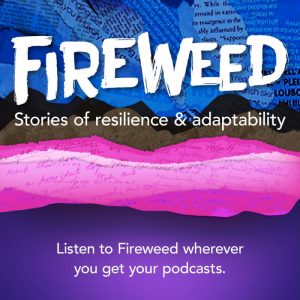Fireweed features stories of hope, resilience, and adaptability and is hosted by alumna Bianca Rego. Bianca is a recent graduate of the BCIT Broadcast and Online Journalism program, an award-winning journalist, and Producer at 980 CKNW. Her natural curiosity, commitment, experience, and tenacity has led her to hosting season two of Fireweed — a podcast which encourages lifelong learning and resiliency.
Building a global experience: From Hong Kong to Vancouver

Today, Bianca is a two-time award-winning journalist whose goal is to share unique stories showcasing communities targeted by oppression in order to shift the social narrative towards inclusivity, representation, and true reconciliation. However, before she had even considered a career in journalism, she was teaching English to children in Hong Kong.
Bianca graduated from university with an honours degree in English Literature and a minor in Modern History in 2016, but she didn’t know what was next for her career. With a love for traveling and working with children, she pursued her Teaching English Language as a Second Language certification in 2017 and began applying for international teaching opportunities.
After a rigorous application process, she accepted a teaching position with an English Learning Centre in Hong Kong. She was one of five hundred applicants.
It was shortly after Bianca’s move to Hong Kong in 2019 that protests broke out in the city and she began reporting the situation on her own social media. This was Bianca’s first, unofficial attempt at journalism.
As the intensity of the protests mounted each day, Bianca chose to return to Vancouver in February of 2020.
How BCIT paved the path for a career in journalism
When Bianca returned to Vancouver, the city was under strict pandemic protocols and lockdown so she decided to take a free online investigative journalism course offered by Columbia University. The course sparked her curiosity to learn more about journalism by enrolling in the BCIT Broadcast and Online Journalism program.
Bianca began her classes on Zoom in September 2020, where she learned what made news, “news” and mastered the journalistic style of writing, which was different than the analytical style she was used to. Bianca applauds her instructors for the relevant and first-hand experience they shared with her about the journalism field. In particular, she’s grateful that her instructors have taught her the importance of unbiased storytelling. It’s about respecting one’s values and morals, considering both sides to each story, to present an unbiased depiction of the facts to give a voice to the voiceless.
As she progressed through the two-year diploma program, she committed to shifting the narrative and amplifying diverse voices. In particular, Bianca strives to decenter the white, male, heteronormative media stream by finding and featuring stories that explore gender, equity, identity, decolonization, and the interstices in between.
In her first year, she was awarded the prestigious CBC Alexis Mazurin Award for her radio documentary that focused on the challenges of postpartum depression during the COVID-19 pandemic. She also received the BC Association of Broadcasters Pioneer Award for Excellence in Broadcasting in 2021.
Bianca supports her commitments with action. As a radio show producer, she ensures that she is using the proper pronouns for guests at the start of each interview and including the voices of experts from underrepresented demographic. She has been applauded for her efforts, as the chart-topping shows include the voices of women and people from underrepresented communities.
Tips for future journalism students
The industry-focused and applied learning model at BCIT allow students like Bianca to access real-world industry experience and connections in their chosen field before they graduate.
Bianca encourages prospective students to take part in work-integrated learning opportunities, such as internships and practicums, because it’s a way to build resume and portfolio, gain hands-on experience, and build connections. Connections are particularly valuable as they lead to one opportunity after another, just as it did for Bianca.
Bianca’s recognition from CBC landed her a position as a traffic reporter, which led to an internship and subsequent producer role with CKNW. From there, Bianca took on a co-op placement with JAR Audio, the podcast agency and producer of Fireweed, which subsequently led to her becoming the host of Fireweed season two.
“There are a lot of opportunities to build trust and connect with many people who choose to share their story with you,” adds Bianca. “You need to have compassion and understanding and give people the time and space to tell their story.”
Interested in a career in Broadcast and Online Journalism? Learn more about the BCIT Broadcast and Online Journalism program.
How Bianca connects to the Fireweed podcast
 To Bianca, Fireweed is an amalgamation of voices and topics that people should care about, including sustainable flight.
To Bianca, Fireweed is an amalgamation of voices and topics that people should care about, including sustainable flight.
“Everyone loves to travel, but we learn about the toll we take using planes to get to where we are going, and it makes you more conscientious,” explains Bianca.
“In our evolving world, podcasts have become a great way to deliver stories to the public because of their accessibility and candid insights into real stories. There are so many opportunities to learn from each other, and Fireweed is just another way to connect.”
She also adds, “I really hope there’s a season three.”
Listen to Fireweed wherever you get your podcasts, including Apple Podcasts, Google Podcasts, and Spotify.
